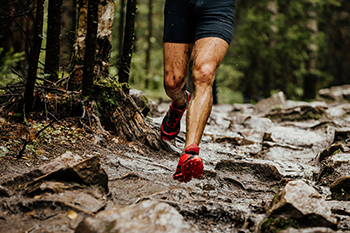
Running on trails requires many precautions that are not needed for other types of exercise or sport. Among the most important considerations is finding the proper footwear. Here are some tips from experts for selecting trail running shoes that can enhance your safety and increase your enjoyment. This type of shoe falls into three categories, including light trails, rugged trails, and off trails. Light trail shoes are made of fairly stiff materials that offer some protection from rocks, but serve well on more groomed trails. Rugged trail shoes are sturdier and have tougher soles that may help to prevent slipping, while providing more stability against foot rotation. They also have thicker exteriors to ward off thorns and brush. Off trail shoes are the most rugged, providing extra protection against rough terrain. They hold up well in bogs, streams and other slippery spots. As with all running footwear, trail running shoes must fit properly, while taking into account the socks that you will wear. For more information on what type of shoes to purchase for trail running, it is suggested that you consult a podiatrist.
All runners should take extra precaution when trying to avoid injury. If you have any concerns about your feet, contact Harvey Jacobs, DPM of Quality Foot Care Center. Our doctor will treat your foot and ankle needs.
How to Prevent Running Injuries
There are a lot of mistakes a runner can make prior to a workout that can induce injury. A lot of athletes tend to overstretch before running, instead of saving those workouts for a post-run routine. Deep lunges and hand-to-toe hamstring pulls should be performed after a workout instead of during a warmup. Another common mistake is jumping into an intense routine before your body is physically prepared for it. You should try to ease your way into long-distance running instead of forcing yourself to rush into it.
More Tips for Preventing Injury
- Incorporate Strength Training into Workouts - This will help improve the body’s overall athleticism
- Improve and Maintain Your Flexibility – Stretching everyday will help improve overall performance
- “Warm Up” Before Running and “Cool Down” Afterward – A warm up of 5-10 minutes helps get rid of lactic acid in the muscles and prevents delayed muscle soreness
- Cross-Training is Crucial
- Wear Proper Running Shoes
- Have a Formal Gait Analysis – Poor biomechanics can easily cause injury
If you have any questions, please feel free to contact our office located in Somerset, NJ . We offer the newest diagnostic and treatment technologies for all your foot care needs.
